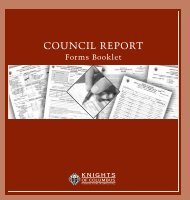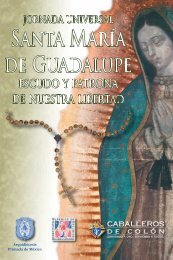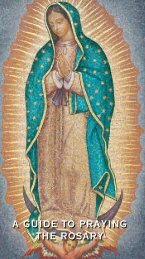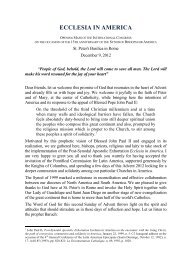CATHOLIC WORD BOOK - Knights of Columbus, Supreme Council
CATHOLIC WORD BOOK - Knights of Columbus, Supreme Council
CATHOLIC WORD BOOK - Knights of Columbus, Supreme Council
Create successful ePaper yourself
Turn your PDF publications into a flip-book with our unique Google optimized e-Paper software.
Cura Animarum: A Latin phrase, meaning<br />
care <strong>of</strong> souls, designating the pastoral<br />
ministry and responsibility <strong>of</strong> bishops and<br />
priests.<br />
Curia: The personnel and <strong>of</strong>fices through<br />
which (1) the pope administers the affairs<br />
<strong>of</strong> the universal Church, the Roman Curia<br />
(See p. 253), or (2) a bishop the affairs <strong>of</strong> a<br />
diocese, diocesan curia. The principal<br />
<strong>of</strong>ficials <strong>of</strong> a diocesan curia are the vicar<br />
general <strong>of</strong> the diocese, the chancellor,<br />
<strong>of</strong>ficials <strong>of</strong> the diocesan tribunal or court,<br />
examiners, consultors, auditors, notaries.<br />
Custos: A religious superior who presides<br />
over a number <strong>of</strong> convents collectively<br />
called a custody. In some institutes <strong>of</strong><br />
consecrated life a custos may be the deputy<br />
<strong>of</strong> a higher superior.<br />
D<br />
Dean: (1) A priest with supervisory<br />
responsibility over a section <strong>of</strong> a diocese<br />
known as a deanery. The post Vatican II<br />
counterpart <strong>of</strong> a dean is an episcopal vicar.<br />
(2) The senior or ranking member <strong>of</strong> a<br />
group.<br />
Decision: A judgment or pronouncement<br />
on a cause or suit, given by a church<br />
tribunal or <strong>of</strong>ficial with judicial authority.<br />
A decision has the force <strong>of</strong> law for<br />
concerned parties.<br />
Declaration: (1) An ecclesiastical document<br />
which presents an interpretation <strong>of</strong> an<br />
existing law. (2) A position paper on a<br />
specific subject; e.g., the three declarations<br />
issued by the Second Vatican <strong>Council</strong> on<br />
religious freedom, non Christian religions,<br />
and Christian education.<br />
-24-<br />
Decree: An edict or ordinance issued by a<br />
pope and/or by an ecumenical council,<br />
with binding force in the whole Church;<br />
by a department <strong>of</strong> the Roman Curia, with<br />
binding force for concerned parties; by a<br />
territorial body <strong>of</strong> bishops, with binding<br />
force for persons in the area; by individual<br />
bishops, with binding force for concerned<br />
parties until revocation or the death <strong>of</strong> the<br />
bishop. The nine decrees issued by the<br />
Second Vatican <strong>Council</strong> were<br />
combinations <strong>of</strong> doctrinal and pastoral<br />
statements with executive orders for action<br />
and movement toward renewal and reform<br />
in the Church.<br />
Dedication <strong>of</strong> a Church: The ceremony<br />
whereby a church is solemnly set apart for<br />
the worship <strong>of</strong> God. The custom <strong>of</strong><br />
dedicating churches had an antecedent in<br />
Old Testament ceremonies for the<br />
dedication <strong>of</strong> the Temple, as in the times <strong>of</strong><br />
Solomon and the Maccabees. The earliest<br />
extant record <strong>of</strong> the dedication <strong>of</strong> a<br />
Christian church dates from early in the<br />
fourth century, when it was done simply<br />
by the celebration <strong>of</strong> Mass. Other<br />
ceremonies developed later. A church can<br />
be dedicated by a simple blessing or a<br />
solemn consecration. The rite <strong>of</strong><br />
consecration is generally performed by a<br />
bishop.<br />
Deposit <strong>of</strong> the Faith: The body <strong>of</strong> saving<br />
truth, entrusted by Christ to the Apostles<br />
and handed on by them to the Church to<br />
be preserved and proclaimed. As embodied<br />
in Revelation and Tradition the term is<br />
very nearly coextensive with objective<br />
revelation, in that it embraces the whole <strong>of</strong><br />
Christ’s teaching. But the term <strong>of</strong> deposit<br />
highlights particular features <strong>of</strong> the<br />
apostolic teaching implying that this

















